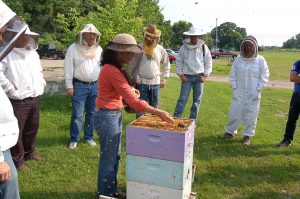The Bee Squad: Partnerships in Beekeeping

The Bee Squad in Minneapolis, Minnesota came about after a huge surge in backyard beekeeping in 2011/2012. At the time, there was no state apiary program and the Bee Squad was the only extension program. Dr. Marla Spivak at the University of Minnesota Bee Lab felt such a program was needed to help new beekeepers and educate them. The Bee Squad became part of the university lab.
This partnership “allows us to really focus on the education part and really focus on helping beekeepers and non-beekeepers in ways that are really attuned to what’s going on with the research and what really makes sense,” says Bridget Mendel Lee who works with Marla at the Bee Squad and the Bee Lab. “We are working with methods that really work for this climate and this particular region and this urban area in particular. And that’s always evolving.”
A major challenge of urban beekeeping in Minneapolis is “the density of beekeepers is really high and [so is] transmission of drift of mites, so we have to make sure the bees are well cared for,” says Marla.

The Bee Squad strongly advocates mite testing and so they sell mite kits (of powdered sugar, shaker, measuring scoop and instructions with pictures on how to use). “We really advocate for treatment according to where you are not just what we do in Minnesota,” says Bridget. “Because we are also talking to beekeepers who aren’t in our region.” The Bee Squad partnered with the University of Maryland and Michigan State to create an online platform where people can input their testing data and see what’s happening in their region.
Key to the Bee Squad’s reach is the various ways in which they partner with the community and with funders. The Bee Lab at the university was funded by state bonds, gifts, and donations. These came from all kinds of people in all kinds of income brackets, all of which made the difference. The Bee Squad was funded by folks that are also Bee Squad customers. “Many of our customers participate because they want to support the lab; and many donate far beyond the cost of the program.
Educating all supporters and customers helps “reach a lot of people at once by talking to large companies, but information spreads through family networks and neighborhoods, too.” Talking to people who start out hating bees, says Bridget, has been really interesting.

Like Kristy Lynn Allen of the Beez Kneez, Marla and Bridget find that bees have a reach beyond political affiliation and income status. “This is about bees and about changing our landscape on whatever level you want to take that,” says Marla.
“Our customers make a difference with huge amounts of funding; others with planting gardens, talking to neighbors, doing citizen science, or organizing educational opportunities for their communities.”
Bridget and Marla have seen the landscape of Minnesota change a lot since they started this project – more pollinator-friendly yards in Minneapolis and more political advocacy through groups like Pollinate Minnesota. Much like Kristy, the Bee Squad is carving their own path of a majority female-run operation with about 15-20 people on staff, most employed part-time.
Media Attributions
- Marla Spivak © Marla Spivak is licensed under a All Rights Reserved license
- Bridget Mendel-Lee © Bridget Mendel-Lee is licensed under a All Rights Reserved license
- Marla Spivak leads queenrearing course © Marla Spivak is licensed under a All Rights Reserved license


Feedback/Errata